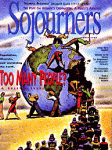A ghastly holocaust has taken the lives of nearly a half-million people in Rwanda, and the international community has buried its head in the sand.
The media have generally depicted the genocide in Rwanda as just another ethnic-based conflict in Africa. Such a characterization has contributed to the general apathy, elicited feelings of helplessness, even donor fatigue, and provided an excuse for international inaction.
Racism is also driving the lack of international response. In less than five weeks, the numbers of people massacred in Rwanda exceeded the numbers of people slain in Bosnia after two years. But where is the international outrage against genocide in Rwanda? After six million Jews were exterminated in Hitler’s gas chambers, many in the West claimed they would have acted had they only known. They declared "never again." Well, it is happening again.
The butchery of an ethnic group has been captured on television and in front-page headlines. But U.N. Secretary General Boutros Boutros-Ghali’s pleas for urgent international intervention have been largely unheeded outside of Africa, as the United States and others debate whether, when, and how to stop the carnage.
In Rwanda, the massacres of Tutsi by Hutu are not the result of ethnic rivalry, but a struggle for power, at any cost. Contrary to media-incited opinion, tribal antagonism alone does not explain the Rwanda horror story, although ethnic divisions between Tutsi and Hutu do exist. The slaughter of Tutsi is a campaign of political violence carefully concocted and executed by a privileged and extremist element within the political and military leadership. This group of leaders, determined to block the implementation of reforms negotiated in August 1993, set out to annihilate Tutsi as well as kill any Hutu who agreed to the changes that would loosen their exclusive hold on power.
President Juvenal Habyarimana, a Hutu, took power in a military coup in 1973 and became unpopular due to a general economic decline in the country and corruption and nepotism within his government. Beginning in 1990 a combination of factors led to the formation of a coalition government and, later, the 1993 peace accords. There were mounting pressures for democratization, and dissatisfaction with the economy. Tutsi refugees seeking ways to return home formed the Rwandan Patriotic Front (RPF) and invaded the country. Human rights abuses carried out by the government against Tutsi as well as Hutu opposition were condemned by international human rights groups.
The 1993 peace accords called for a broad-based transitional government with power shared among Habya-rimana’s National Republican Movement for Democracy (MRND), the internal opposition, and the RPF. Hard-liners within the MRND, resistant to change, successfully stalled the implementation of the agreement.
After the president was assassinated on April 6, a campaign of terror was unleashed against Tutsi and Hutu supporters of the reforms. Members of the MRND accused the Patriotic Front of committing the assassination and perpetrating the subsequent violence. But evidence points to the contrary. Hutu extremist members of the presidential guard reportedly killed moderate government and opposition officials. The systematic slaughter of Tutsi was incited by hate-filled announcements on radio stations affiliated with MRND party supporters. Party militia around the country were armed and trained by the government to torture and kill.
The situation in Rwanda is desperate for decisive international action. It is already too late for a half-million people. How many more lives must be lost before the world community acts?
Ironically, as the Western powers celebrate the peace they won 50 years ago, the peoples that were colonized by them in Sudan, Somalia, Angola, and Rwanda are paying dearly today to achieve long-lasting peace and democracy. In Rwanda, France and Belgium share a counterproductive historical involvement in the country’s internal politics. Africa’s conflicts, increasingly rooted in controversy over control of resources, have been exacerbated by external military and economic support.
In the United States, domestic politics, the Somalia debacle, and inclinations toward isolationism have immobilized President Clinton on this issue. He has yet to state a clear and moral course of action. Advocacy groups have joined others in calling for the United States to provide leadership in supporting U.N. efforts to send peacekeeping forces to protect and provide relief for civilians, especially by providing technical and logistical support; to increase humanitarian assistance, especially health and medical supplies; and to supply resources to help the United Nations hold the perpetrators of the massacres accountable for their deeds.
Since Clinton came to the White House, high-level officials have claimed that Africa is a priority for this administration, and that human need, not politics, will drive U.S. foreign aid responses. Here is a chance to prove it. Stop the genocide in Rwanda.

Got something to say about what you're reading? We value your feedback!